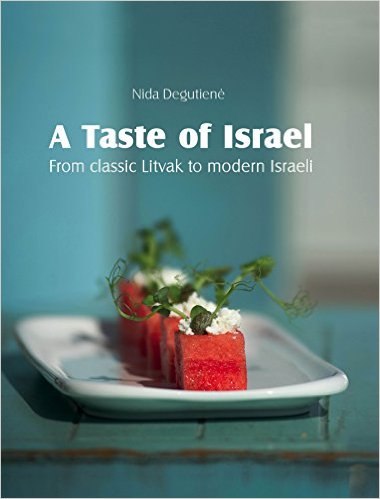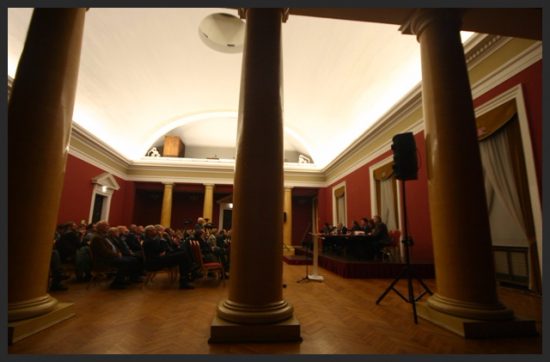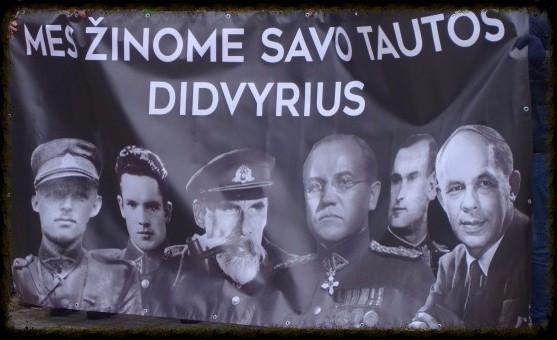Politics of Memory
Neo-Nazis, Glorifying Holocaust Collaborators & Spewing Racism, Again Gifted Center of Kaunas on Lithuania’s Cherished Feb 16th Independence Day
Dr. Efraim Zuroff Awarded Gold Medal by Serbian President Tomislav Nikolic
BELGRADE—The president of Serbia, Tomislav Nikolic, today awarded a Golden Medal for Merit to Dr. Efraim Zuroff, the Simon Wiesenthal Center’s chief Nazi hunter and its Director of East European Affairs, as part of the celebrations of Sretenje, the Serbian republic’s national day. The rationale for the award, which was granted to Dr. Zuroff for “exceptional achievements” included his “selfless dedication to defending the truth about the suffering of Jews, and also Serbs, Roma and other nations during World War II.”
Kaunas, Lithuania: Run-Up to the February 16th 2017 Neo-Nazi March on Independence Day
Kaunas Mayor & City Council Deciding
whether to again allow neo-nazis sporting banners adulating Holocaust collaborators to take over the city center on Lithuania’s cherished February 16th Independence Day next week
PREVIOUS YEARS IN KAUNAS IN VILNIUS IN RIGA DH SECTION
From left: Adolfas Ramanauskas-Vanagas, Jonas Noreika, Povilas Plechavičius, Kazys Škirpa, Antanas Baltūsis-Žvejas, and Juozas Ambrazevičius-Brazaitis, under the banner translating “We know our nation’s heroes”.
“Weekly of Vilnius” is First to Cover Bloshtein Petition in Lithuanian Media
PIRAMÓNT | PAPER TRAIL | OPPOSITION | CEMETERIES
◊
VILNIUS—The prestigious Weekly of Vilnius, which provides a digest and interpretation in English of news concerning Lithuania, especially for the diplomatic, governmental, business, academic, arts, cultural and international affairs communities, became the first publication, in its 5 February issue, to break the ostensible wall of silence in the Lithuanian media on the international petition by Vilnius native and resident Ruta Bloshtein. Her petition, concerning the fate of the old Jewish cemetery at Piramónt in the Šnipiškės (Shnípishok) district of Vilnius, the nation’s capital, has to date garnered close to 38,000 signatures, making it the largest Litvak effort since the Holocaust. The petition calls on Lithuania’s president, prime minister, chancellor, the mayor of Vilnius and the European Commission’s president to move the project of a new national convention center away from the old cemetery. It comes after years of local and international opposition to the project. The Weekly of Vilnius, edited by the widely admired Nehro Khalil, has been known on more than one occasion to breach walls of silence concerning “the second opinion” on an array of issues and topics.
Additional Reading Suggestions for Participants in a Feb. 2017 Yivo Course
[updated]
◊
The following list has been compiled at the request of several students in a course on Lithuanian Jewry and the Holocaust in Lithuania to be held at the Yivo Institute for Jewish Research in New York in February 2016. It is strictly unofficial, unconnected to the program, and was compiled in Vilnius to complement the course’s own excellent reading list.
Lithuanian Jewish Culture and History
The Holocaust in Lithuania
“Double Genocide” & Other 21st Century Debates
Defending History Reference Pages
CPJCE’S American Affiliate Calls 34,000 Petition Signers “Evil People”
PIRAMÓNT | PAPER TRAIL | OPPOSITION | CEMETERIES
◊
MONROE, NEW YORK—Ignoring the unanimous views of the world’s leading rabbinic authorities in opposition to the project to plonk a 34 million euro convention center in the heart of Vilna’s old Jewish cemetery, surrounded by thousands of graves on all four sides, “Admas Kodesh,” the American Satmar (Aaronites) affiliate of the London-based CPJCE issued a tweet today condemning as “evil people trying to undermine progress” the 34,000 people, including the chief rabbi of Lithuania, who signed Vilnius resident Ruta Bloshtein’s petition calling on the Lithuanian government to find an alternative venue for the convention center.
A Reply to London’s Rabbi Herschel Gluck OBE
PIRAMÓNT | PAPER TRAIL | OPPOSITION | CEMETERIES
◊
LONDON—The world’s greatest rabbinic authorities are unanimously opposed to the project to construct a 34 million euro convention center in the heart of Vilna’s old Jewish cemetery, surrounded by thousands of graves on all four sides. And now, 34,000 people around the world have also spoken up in a new international petition. Nevertheless, one group of London rabbis, the “CPJCE” (Committee for the Preservation of Jewish Cemeteries in Europe [italics added]) continues to campaign for the convention center in close cooperation with the local business interests and politicians. Its Rabbi Herschel (Hershel) Gluck OBE has spoken out in the London Jewish Chronicle, trashing the petition of a Vilnius born Orthodox Jewish woman, Ruta Bloshtein.
Neither Rabbi Gluck nor the Jewish Chronicle mention that his “CPJCE” was allegedly exposed in Wikileaks (reports in the Jerusalem Post, Times of Israel, DH) for demanding money for their “supervision”. Rabbi Gluck told the London Jewish Chronicle:
Nida Degutiene’s Litvak-Israeli Cookbook Featured at NY’s Lithuanian Consulate in Cooperation with Yivo
OPINION | EVENTS | BOOKS | YIVO’S “LITHUANIAN PR” AGENDA
◊
 NEW YORK—Tomorrow’s daytime event featuring Nida Degutiene’s new book, A Taste of Israel: From Classic Litvak to Modern Israel (Penguin Random House South Africa 2016) is a joint production of the Consulate General of Lithuania in New York City and the Yivo Institute for Jewish Research. It will be held at the Consulate General’s offices at 420 Fifth Avenue at 12:30 PM on Monday 16 January 2017. Defending History recommends the event to our readers in the New York City area and we recommend Ms. Degutiene’s excellent book (available from many outlets including Amazon).
NEW YORK—Tomorrow’s daytime event featuring Nida Degutiene’s new book, A Taste of Israel: From Classic Litvak to Modern Israel (Penguin Random House South Africa 2016) is a joint production of the Consulate General of Lithuania in New York City and the Yivo Institute for Jewish Research. It will be held at the Consulate General’s offices at 420 Fifth Avenue at 12:30 PM on Monday 16 January 2017. Defending History recommends the event to our readers in the New York City area and we recommend Ms. Degutiene’s excellent book (available from many outlets including Amazon).
Vilnius Resident Launches Petition on City’s Old Jewish Cemetery
PIRAMÓNT | PAPER TRAIL | OPPOSITION | CEMETERIES
◊
VILNIUS—Ruta Bloshtein, a native and resident of the Lithuanian capital, and stalwart of its small Orthodox community, has launched an international petition via Change.org asking the leaders of Lithuania to move the project for a national convention center away from the old Jewish cemetery at Piramónt where many thousands of the city’s Jewish citizens were buried from the 15th to the 19th centuries. It is one of East European Jewry’s most sacred sites. Many of its gravestones were lovingly preserved or renewed right up to the Holocaust, in which around 99% of Vilna’s Jewish community perished.
“Surreal” Nov. 29th Vilnius Public Debate on Street Named for Nazi Collaborator
[LAST UPDATE]
In Vilnius, City Council Holds “Surreal” Public Debate on 29 Nov. 2016 on Street Name Honoring a Nazi Collaborator; But Will the Mayor (Who Did Not Attend) Ever Speak Out with Moral Clarity?

Keynote speaker was Mark Adam Harold, the British born city councillor who “courageously and dramatically” proposed renaming the street that currently honors Nazi collaborator K. Škirpa.
The Photograph
MEMOIRS
◊
by Motiejus Martišius
◊
Whenever I drive from Skaudvilė to Batakiai I almost always turn off the road at Šilas, stopping at the location of the mass grave of the people who were shot there in 1941. Here, the sky is always dark. The sunlight over the graves is blocked out by a forest of unruly spruce, birches, aspen. Everything seems completely calm here. Occasionally, I catch the light scent of the forest, carried out on a breeze as the wind roars through the trees. I pause. I remove my hat. Slowly, I pull a photograph out of a notebook I carry with me always. A twelve year old girl smiles out at me from that photograph. The photograph is quite worn out. In places there are creases. That’s because I have been carrying this photograph around with me for many years now. The person who this photograph belongs to is already long gone and buried. I listen and I can almost hear her voice: “My Algis, farewell. I am leaving forever.”Continue reading
Conference on East European Holocaust Opens in Warsaw
Conference in Warsaw, 5–7 December 2016:
Conference Features Omer Bartov, Christoph Dieckmann, Dan Michman, Antony Polonsky, Grzegorz Rossoliński-Liebe, Saulius Sužiedėlis, Rūta Vanagaitė, Efraim Zuroff, and Other Major Specialists on the Holocaust in Eastern Europe
Expectations rising that the Lithuanian government sponsored “Red-Brown Commission” (three of whose members are speaking) may now publicly call for (1) research (and acknowledgment of extant research and testimony) on massive “pre-German violence” in dozens of towns in the last week of June 1941; (2) written state apologies to defamed Holocaust survivors Yitzhak Arad, Fania Brantsovsky, Pinchos Fridberg, Rachel Margolis and Joseph Melamed; (3) dismantling of public-space shrines, street names, university lecture halls etc that honor Holocaust collaborators; (4) repeal of the 2010 “red-brown jailtime law” that effectively criminalizes free debate; (5) abandonment of official adherence to 2008 Prague Declaration (and acknowledgment of the need for consideration also of the points made in the 2012 Seventy Years Declaration).
Surreal Vilnius City Council Public Debate on Street Named for Nazi Collaborator
But Will the Mayor (Who Did Not Attend) Ever Speak Out with Moral Clarity?

Keynote speaker was Mark Adam Harold, the British born city councillor who “courageously and dramatically” proposed renaming the street that currently honors Nazi collaborator K. Škirpa.
Conflict of Interest as Red-Brown Commission Chief Legitimized by Meeting with “Litvak Leaders”?
OPINION | RED-BROWN COMMISSION | ISRAEL AFFAIRS
◊
VILNIUS—The 22 November edition of the Jerusalem Post carried the following news item about an international meeting at the Peres Center for Peace and Innovation.
Lithuanian and Israeli diplomats, academics, and government officials, together with representatives of Litvak organizations in Israel, the American Jewish Committee, the World Jewish Congress and the Tel Aviv Municipality, will congregate on Thursday at the Peres Center for Peace and Innovation to discuss Lithuania and Israel – Past, Present and Future. Among the Lithuanians will be Lithuanian Ambassador Edminas Bagdonas, Ronaldas Račinskas, executive director of the International Commission for the Evaluation of the Crimes of the Nazi and Soviet Occupation Regimes in Lithuania; Faina Kukliansky, chairwoman of the Lithuanian Jewish Community; and several other Lithuanian dignitaries. Among the topics tabled for discussion is the reinstatement of Lithuanian citizenship to Lithuanian expatriates living in Israel.
Antisemitism in the 21st Century Shtetl
OPINION | ANTISEMITISM | COMMEMORATIONS FOR DESTROYED COMMUNITIES
◊
by Dovid Katz
This article appeared today in ISGAP Flashpoint:
◊
The words “antisemitism in the shtetl” might evoke recollections of Fiddler on the Roof, a touch of family lore “from the old country” way back when, or for those familiar with modern Yiddish literature, a scene from this or that writer. Baffling as it may sound, however, it a substantial contemporary topic in the study of antisemitism, and, perhaps even more surprisingly, part of a phenomenon with implications for the future, given the vast number of cities, towns and villages in the world with a rich Jewish history but no living Jews, where potent anti-Jewish feeling (as well as pro-Jewish feeling) can be observed. As noted back in Flashpoint 21, antisemitism in Eastern Europe is very different from its much better known Western and Middle East incarnations.
READ MORE
Is Eastern European “Double Genocide” Revisionism Reaching Museums?
HISTORY | DOUBLE GENOCIDE | MUSEUMS | COLLABORATORS GLORIFIED
◊
by Dovid Katz
This paper appeared today in Dapim: Studies on the Holocaust, published by Taylor and Francis.
ABSTRACT: In contrast to twentieth-century Holocaust Denial, the most recent assault on the narrative of the genocide of European Jewry has emanated from a sophisticated revisionist model known as Double Genocide, codified in the 2008 Prague Declaration. Positing “equality” of Nazi and Soviet crimes, the paradigm’s corollaries sometimes include attempts to rehabilitate perpetrators and discredit survivors. Emanating from pro-Western governments and elites in Eastern Europe in countries with records of high collaboration, the movement has reached out widely to the Holocaust Studies establishment as well as Jewish institutions. It occasionally enjoys the political support of major Western countries in the context of East-West politics, or in the case of Israel, attempts to garner (eastern) European Union support. The empirical effects to date have included demonstrable impact on museums, memorials and exhibits in Eastern Europe and beyond.
◊
The demise of twentieth-century-style Holocaust denial in mainstream Western society is aptly symbolized by David Irving’s loss to Deborah Lipstadt in the London High Court in 2000. But around the same time, a new and more irksome method of writing the Holocaust out of history was emerging under the radar, this time without necessarily denying any of the historical events or a single death. Particularly in Eastern Europe, it was being forged with state funding and more subtle powers of persuasion in academia, the media, the arts and international diplomacy.
READ MORE
Vilnius Remembers Valerijus Čekmonas on his 80th
VILNIUS—While some biographies cite 1937 as the year of Professor Valerijus Čekmonas’s birth, many of his numerous students and admirers both here in Vilnius, and internationally, who were heartboken by his untimately death in 2004, are taking the 1936 year as definitive and celebrating his life this season on the occasion of what would have been his eightieth birthday.
Why Can’t Riga Just Replace a Plaque on the Wall?
OPINION | POLITICS OF MEMORY | LATVIA
◊
by Aleksandrs Feigmanis (Riga)
◊
I am a tour guide in Latvia, Lithuania and Estonia. Whenever I take tourists through Riga’s fabled Old Town, we together pass, on the way from Town Hall Square to the still-functioning synagogue, the address Peldu Street 15, right on the corner of Peldu and Kungu. There is a high school building and a twenty-four-hour parking lot guarded all the time. And right in front of us, on the outside wall of Peldu 15, there is the half-destroyed plaque for the Righteous Among the Nations Anna Alma Pole.
